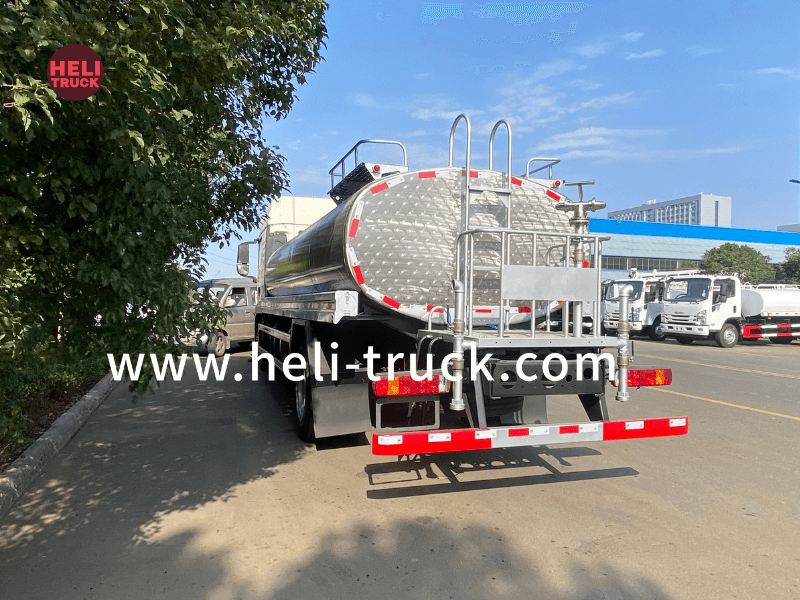** url : Comprehensive Guide to Garbage Compactor Truck Troubleshooting**
**Introduction**
Garbage compactor trucks are essential for waste management in urban and rural areas alike. They are designed to efficiently collect and compact waste, making the transportation process more manageable. However, like any machinery, they can encounter problems that may hinder their performance. This article aims to provide a detailed guide on troubleshooting common issues faced by garbage compactor trucks. We will cover various areas, including mechanical, electrical, and operational aspects, while also offering preventive maintenance tips to minimize future issues.
---
**1. Understanding the Garbage Compactor Truck**
Before diving into troubleshooting, it's essential to understand the basic components and functions of a garbage compactor truck. These trucks typically consist of:
- **Chassis**: The frame that supports the truck and compactor.
- **Compaction Unit**: The mechanism that compresses waste into the compaction chamber.
- **Hydraulic System**: Powers the compaction unit and other hydraulic functions.
- **Body**: The container that holds the compacted waste.
- **Loader**: The part that picks up waste bins and transfers the contents into the truck.
- **Electrical System**: Controls various functions of the truck, including safety features and operational controls.
Understanding these components helps in diagnosing issues effectively.
---
**2. Common Issues and Troubleshooting Techniques**
### 2.1 Mechanical Issues
#### 2.1.1 Compaction Problems
**Symptoms**: The compactor is not compressing waste effectively.
**Troubleshooting Steps**:
- **Check the Compactor Blades**: Inspect the blades for wear and tear. Dull blades may not compress waste effectively. Replace if necessary.
- **Hydraulic Fluid Levels**: Low hydraulic fluid can lead to inadequate pressure. Check and refill as needed.
- **Hydraulic Cylinder Leaks**: Inspect for any leaks around hydraulic cylinders. Replace seals or cylinders if leaks are detected.
- **Compaction Timing**: Ensure the compaction cycle is set correctly. Refer to the manual for correct timing settings.
#### 2.1.2 Loader Malfunctions

**Symptoms**: The loader is not picking up bins correctly.
**Troubleshooting Steps**:
- **Check for Obstructions**: Inspect the loader arms for debris or mechanical obstructions that may hinder movement.
- **Hydraulic System Inspection**: Ensure that the hydraulic system powering the loader is functioning correctly. Look for leaks or damaged hoses.
- **Electrical Connections**: Ensure that all electrical connections related to the loader are secure and functioning.
### 2.2 Electrical Issues
#### 2.2.1 Power Failure
**Symptoms**: The truck does not power on or shows erratic electrical behavior.
**Troubleshooting Steps**:
- **Battery Check**: Inspect the battery for charge and connections. Clean terminals and replace the battery if necessary.
- **Fuses**: Check for blown fuses in the electrical panel. Replace any blown fuses and check for underlying issues.
- **Wiring Inspection**: Look for frayed or damaged wires that may cause short circuits. Repair or replace damaged wiring.
#### 2.2.2 Control Panel Issues
**Symptoms**: The control panel is unresponsive or displays error codes.
**Troubleshooting Steps**:
- **Power Supply**: Ensure that the control panel is receiving power. Check connections and fuses.
- **Error Codes**: Refer to the truck's manual to interpret any displayed error codes. Follow troubleshooting steps outlined for specific codes.
- **Reset the System**: Sometimes, a simple reset of the control panel can resolve temporary glitches.
### 2.3 Hydraulic System Issues
#### 2.3.1 Hydraulic Leak
**Symptoms**: Visible fluid leaks from the hydraulic system.
**Troubleshooting Steps**:
- **Locate the Leak**: Inspect hoses, cylinders, and connections for signs of leaks.
- **Hose Condition**: Check hoses for cracks or wear. Replace any damaged hoses.
- **Connection Tightness**: Ensure all hydraulic connections are tight and secure.
#### 2.3.2 Inadequate Pressure
**Symptoms**: The compactor or loader is slow to respond.
**Troubleshooting Steps**:
- **Fluid Levels**: Check hydraulic fluid levels and refill if low.
- **Filters**: Inspect and replace hydraulic filters if clogged.
- **Pump Functionality**: Test the hydraulic pump for proper operation. Replace if defective.
---
**3. Preventive Maintenance Tips**
Preventive maintenance is crucial for ensuring the longevity and efficiency of garbage compactor trucks. Here are some tips:
### 3.1 Regular Inspections
Conduct regular inspections of all major components, including the hydraulic system, electrical system, and compaction unit. Look for signs of wear and address issues before they escalate.
### 3.2 Scheduled Maintenance
Follow the manufacturer's recommended maintenance schedule for oil changes, hydraulic fluid replacements, and other routine tasks. Keeping records of maintenance can help track any recurring issues.
### 3.3 Cleanliness
Keep the truck clean, especially the compaction chamber and loader. Regular cleaning prevents the buildup of waste and debris that can cause mechanical issues.
### 3.4 Operator Training
Ensure that operators are properly trained in the use and maintenance of garbage compactor trucks. Proper operation reduces the risk of damage and accidents.
### 3.5 Documentation
Maintain a log of all repairs and maintenance performed on the truck. This documentation can help identify patterns and inform future troubleshooting efforts.
---
**4. Conclusion**
Garbage compactor trucks play a vital role in waste management, and understanding how to troubleshoot common issues is essential for any operator or fleet manager. By following the steps outlined in this guide, you can diagnose and resolve mechanical, electrical, and hydraulic problems effectively. Additionally, implementing preventive maintenance practices will help minimize downtime and extend the life of the equipment.
Regular training and documentation will also play a crucial role in maintaining the efficiency of garbage compactor trucks. With proper care and attention, these vehicles can continue to serve their purpose effectively, keeping our communities clean and waste-free.
---
This concludes our comprehensive guide on garbage compactor truck troubleshooting. By being proactive and knowledgeable, you can ensure that your waste management operations run smoothly and efficiently.
